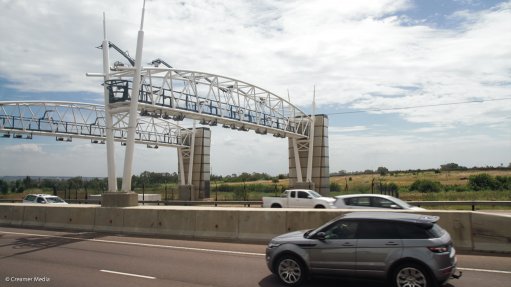
Photo by: Duane Daws
Ringfencing a portion of the fuel levy to pay for the Gauteng Freeway Improvement Project (GFIP) and e-tolling system would be “unfair” to road user in parts of the country that did not make use of the road network that has been upgraded under this scheme, Transport Minister Dipuo Peters said on Tuesday.
“[Applying a national] fuel levy to pay for 201 km of roads in Gauteng will be unfair to the rest of the country. While [the e-toll system] is not ideal, what would have happened if we had done nothing?” she asked.
Peters’ comments came during the Department on Transport’s (DoT’s) submission to the Advisory Panel on the Socioeconomic Impact of E-tolls, which had been tasked by Gauteng Premier David Makhura to investigate the socioeconomic impact of the tolling system on the province.
The formation of the panel had revealed apparent discord between the Gauteng provincial government (GPG) and national government over whether or not the e-tolling system remained the most appropriate funding mechanism.
This despite it being revealed on Tuesday that the GPG had proposed the introduction of tolled roads on the province’s freeways prior to Cabinet approval of the GFIP in 2007.
Responding to queries from the panel over whether or not there was a “political leadership” issue surrounding e-tolls, Peters said she was unaware of the motivation for the province’s “change of heart”.
“Where the change of mindset came from, I don’t know. The provincial government has not informed me personally,” she noted.
The panel disclosed, however, that, during the province’s submission to the panel, it had argued that the initial GFIP had included a draft memorandum of understanding (MoU) that outlined a revenue-sharing model that had since been discarded.
Under this MoU, various Gauteng municipalities would receive a portion of the toll revenue to upgrade secondary roads that could be used as alternatives to the tolled freeways.
According to Peters, funds to upgrade secondary roads would, however, be provided through government’s larger Infrastructure Upgrade Plan.
‘There are funds [that were] created in 2011 by President Jacob Zuma to fund these alternative routes, which will be enough,” she noted.
She added that there was no policy contradiction between the national and provincial government “at an African National Congress (ANC) level”.
“There is a policy-making process [within the ANC], and the Gauteng ANC can go that route to engage with and lobby the other eight provinces if [they want] a policy review,” she outlined.
Peters had argued during her earlier presentation that government’s decision to implement the user-pays principle had followed a legal, consultative process that had revealed tolling to be the most appropriate funding mechanism.
National Treasury was expected to make submissions to the panel on Wednesday, followed by the South African National Roads Agency, on Thursday.